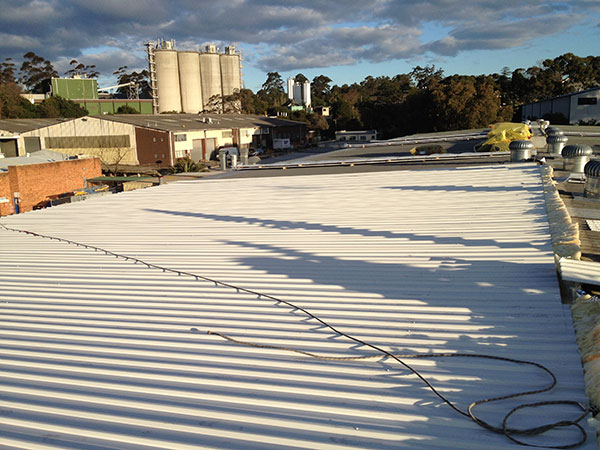Today’s industrial buildings need roofs that are tough. They also have to stand up to very harsh weather. This is vital for places like water treatment plants. There, corrosive materials are a constant problem.
Industrial buildings face serious corrosion risks, especially those near the coast or around chemical fumes. Now, things are getting worse. Environmental and climate shifts are making the serious issue of corrosion even bigger. Because of this, standard roofing options just don’t work as well anymore.
Old-school steel roofing, like galvanized or painted sheets, just isn’t good enough now. These sheets are coated using a spray method, but this process can’t ensure the coating is even. This method often leaves behind tiny cracks and pinholes. These flaws are a direct path to pitting and crevice corrosion. A much stronger solution is needed.
To make sure a roof is safe and performs well for a long time, it must meet several technical needs, especially in a water treatment plant.
High humidity and chemical fumes are a given in water treatment facilities. These conditions create chemical reactions that cause metal to oxidize. On top of that, rainwater can wear away protective coatings, making corrosion happen even faster.
Regular temperature swings cause materials to expand and shrink. This creates thermal stress, which can lead to stress corrosion cracking. What’s more, sunlight is a big problem. Long-term UV exposure breaks down the protective layers on organic coatings and plastics. This makes corrosion even worse.
For a plant to run well, it needs roofing materials that don’t need much upkeep and have a long lifespan. Shutting down for roof repairs can cause major delays and cost a lot of money.
Standard color-coated steel sheets are known to develop pitting and crevice corrosion over the years. This makes them a poor choice for corrosive places.
Over time, UV rays and thermal changes cause real problems. They lead to ugly decay and functional damage, which means more work and constant maintenance.
The hidden expenses from regular repairs and replacements are big. In harsh places like water treatment plants, roofing and wall panels might have to be replaced every 2–3 years. This results in huge financial losses.
TSP (Thermoplastic Sealed Protection) is a brand-new type of roofing. It was made just for industrial areas with high risks of corrosion.
TSP sheets are a composite with multiple layers:
Spray-coated sheets have uneven coverage and microholes. TSP is different. It uses a film that is bonded right onto the steel sheet. This film creates a seal that is completely airtight, which cuts the steel off from anything that could corrode it. It’s a better way.
TSP roofs have a lot of performance benefits. These make them perfect for tough industrial settings.
A TSP roof might cost more at the start, but the savings over time are considerable.
Facility managers should look at the total cost of ownership, not just the price tag. Traditional sheets seem cheaper at first. But they come with repeating costs for repairs and early replacements. When you add up labor, downtime, and material decay, the long-term value of TSP becomes clear.
When you put TSP up against older systems, it wins on all the important points.
TSP is useful for more than just water treatment plants. It’s very resistant to acid rain, chloride ions, and moisture, making it a great choice for many other tough places. These include coastal areas, industrial zones, and mining sites. You can also get it customized with different colors, profiles, and load-bearing specs to fit your project’s needs.
Jieli is a leader in creating new anti-corrosion roofing technology.
We have deep expertise in advanced material solutions. Our exclusive TSP film-coated steel technology, which we’ve been working on since 2016, proves it.
Our products are tested hard under CNAS conditions. These tests show they can resist chemicals for long periods without any sign of rust or decay.
For industries like water treatment that work in chemically harsh and wet conditions, a long-lasting roof is not a luxury. It’s a must. TSP film-coated steel sheets give you unmatched durability, chemical resistance, fire safety, and lasting good looks. As the world looks for more sustainable industrial roofing, solutions like TSP are the future of building materials.
Q1: Is TSP roofing suitable for extremely coastal or marine environments?
A: Yes. High salt and chloride ions can ruin the protective film on metal. But TSP’s airtight film layer stops this damage completely. It is an ideal solution for coastal areas.
Q2: How does TSP compare with stainless steel in terms of corrosion resistance?
A: Stainless steel generally resists corrosion well, but it can have trouble with strong acids, alkalis, and high salt levels. TSP’s sealed film technology gives complete, airtight protection from these specific chemicals. This makes it a more dependable choice in very corrosive places.
Q3: What is the expected lifespan of TSP roofing under typical factory conditions?
A: TSP comes with a 15-year warranty. This ensures it will be a long-term solution, even in the tough industrial conditions you find at a water treatment plant.
